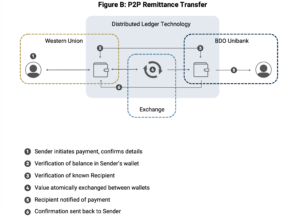
DDP Pilot: Efficient Remittance Payments to Philippines
The Digital Dollar Project (DDP) has completed a pilot study of remittance payments to the Philippines utilizing a simulated retail central bank digital currency (rCBDC).
Western Union and BDO Unibank participated in the initiative as partners.
The endeavor utilized a variant of the Champion Model from the DDP.
A simulated central bank issued CBDCs to an intermediary bank, which granted Western Union (WU) access to them for remittance to a BDO Unibank client in the Philippines.
WU utilized a decentralized exchange (DEX) to trade a dollar CBDC for a Philippine peso CBDC at a third-party-determined real-time rate.
WU received certification of the payment and transferred the funds to the recipient’s bank account.

In contrast to standard practice, the entire transaction was conducted with central bank money instead of commercial bank money.
The DEX was the most critical aspect of the investigation.
The authors noted that the establishment of such a market would have the potential to increase competition and transparency.
They said, however, that the majority of remittances to the Philippines occur when Manila’s markets are closed, so this leg remains problematic.
Privacy concerns were not addressed in the study, but the report did note that distributed ledger technology protects privacy “by allowing granular control over the level of consumer data sharing.”
Using distributed ledger technology, message transmission and value transfer occurred within seconds.
Using current technology, value transmission is more time-consuming than message transfer, introducing counterparty and credit risk. Authors’ conclusion:
“The pilot demonstrated that rather than displacing the service offerings of Western Union and BDO Unibank, CBDCs present an opportunity to modernize processes and promote efficiencies for private sector companies and their customers.”
Typically, remittances range between $200 and $300 per transaction. In 2022, they will be worth $626 billion, according to research cited in the report.
In 2021, the United States will send $74 billion in remittances. Seven percent of American households sent money overseas.
On average, remittances from the United States to the Philippines cost 4.4% of the entire transaction amount, while bank transfers cost 7.98%.
In addition to saving time and money, the simulated procedure would increase transparency.
Christopher Giancarlo, former chairman of the Commodity Futures Trading Commission, co-founded the DDP, which launched its technical laboratory in September. Accenture additionally provided project support.





